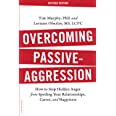Passive-Aggressive Personality Disorder
Passive-aggressive behaviors are those that involve acting indirectly aggressive rather than directly aggressive. Passive-aggressive people regularly exhibit resistance to requests or demands from family and other individuals often by procrastinating, expressing sullenness, or acting stubborn.
Cluster Number:
Wiki Number: PW155
Diagnosis: Passive-Aggressive Personality Disorder
US Patients:
World Patients:
Sex Ratio:
Age Onset: Childhood and beyond into adulthood
Brain Area:
Symptoms: Pervasive pattern of negative attitudes and passive resistance to expectations of adequate performance.
Progression: Persons typically procrastinate, covertly obstruct, are inefficient and stubborn, but nice when they wish to be.
Causes: A childhood were expressions of frustration or anger was not allowed. Children repressed honest feelings.
Medications: None listed.
Therapies: Depending on the behaviors, therpists should use psychodynamic, supportive, cognitive, behavioral & interpersonal methods.
Youtube Video: Understanding Passive-Aggressive Behavior
Amazon or Library Book: Overcoming Passive Aggression
Click the book to link or order from Amazon.

